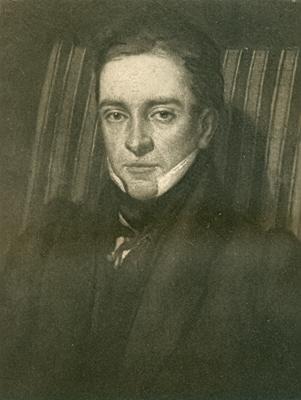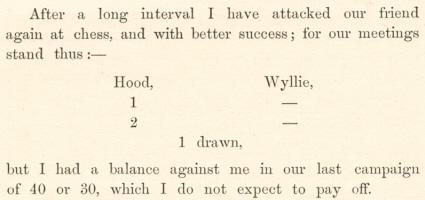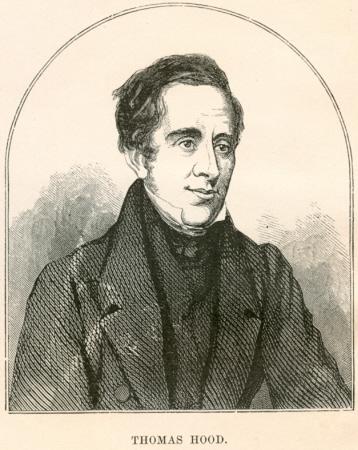
Edward Winter

Frontispiece to The Complete Poetical Works of Thomas Hood (London, 1906)
Thomas Hood (1799-1845) was an eminent literary figure whose interest in chess has seldom been mentioned. We quote some extracts from letters to his brother George which were published in Hood in Scotland: Reminiscences of Thomas Hood, Poet and Humorist collected and arranged by Alexander Elliot (Dundee, 1885):
Pages 109-111: Letter dated circa 7 February 1819:
‘I received your obliging letter per Mr Wyllie, and am grateful to you for the great pleasure which it afforded me.
I promised Mr W. to call on him and try his strength at chess, which I have yet been unable to do, for Christmas brought me no vacation ...’
Later in the same letter:
‘Since writing the above I have had the pleasure of seeing Mr Wyllie, who called to inquire the reason of my not seeing him, and I have returned his visit, and have, moreover, engaged him at chess, gaining five battles out of six. But one trial, of course, is not sufficient to determine the mastery. I must confess that I was afraid my want of practice would have served me worse, but, after leaving your country unconquered, I was resolved not to be beaten by your countryman on my own ground if I could help it. I shall now provide myself with a set, which I have hitherto been without for mere want of somebody to play with. It is true that a young lady within a few doors of us desires me to teach her to play at chess, but to learn it requires so much patience that I am not anxious to attempt the task, recollecting that Job was not a woman.’
Page 130: Letter dated 17 June 1821:
‘I see our friend Wyllie as often as possible. We went together to an exhibition of paintings, some time since, and last Thursday he went with me to our Society, where I gave an essay on Poetry to close the session. But chess I must resign, my head is now so much occupied. Methinks I hear you say, what an altered being I must be to give up chess, and that, too, when I have been beaten! But, from the cause just mentioned, I have ceased to find any amusement in it, and therefore there is no hope of retrieving my laurels.’
Page 136: Letter dated 11 October 1821:

Rod Edwards (Victoria, BC, Canada) writes:
‘In C.N. 5392 you gave excerpts from Hood in Scotland which describe Thomas Hood playing chess with a friend, Andrew Wyllie. Is this the “Wylie” who was part of the Edinburgh team in the London v Edinburgh correspondence match which started in 1824? The team members were named by Staunton on page 329 of the 1842 volume of the Chess Player’s Chronicle, and by H.J.R. Murray on page 879 of A History of Chess. It is reported on page 114 of Hood in Scotland that Andrew Wyllie died prematurely in the autumn of 1825, so if he did start out in the Edinburgh team he did not see it through to the end.’
Readers’ assistance with this query will be appreciated. Our only addition at present is that The Games of The Match at Chess (London, 1829) also had the spelling ‘Wylie’, and also gave no forename.

The illustration above is the frontispiece to The Prose Works of Thomas Hood, volume one (Philadelphia, undated).
From John Townsend (Wokingham, England) comes this passage by Hood on page 547 of the book Hood’s Own (London, 1839):
‘It is pleasant after a match at Chess, particularly if we have won, to try back, and reconsider those important moves which have had a decisive influence on the result. It is still more interesting, in the game of Life, to recal[l] the critical positions which have occurred during its progress, and review the false or judicious steps that have led to our subsequent good or ill fortune. There is, however, this difference, that chess is a matter of pure skill and calculation, whereas the chequered board of human life is subject to the caprice of Chance – the event being sometimes determined by combinations which never entered into the mind of the player.’
Our correspondent comments:
‘Howard Staunton must have held Hood in high esteem, since he contributed a guinea to the public subscription for a monument to him, which was erected at Kensal Green Cemetery on 18 July 1854, more than nine years after his death. The long list of subscribers can be seen in Eliza Cook’s Journal, 5 August 1854, pages 225-229. They include many literary and theatrical figures, such as Alfred Tennyson, W.M. Thackeray, W.C. Macready, John Timbs, Douglas Jerrold and Charles Mackay.’
(7688)
On pages 185-188 of the April 1926 BCM J. Schumer annotated the game Capablanca v Ilyin-Genevsky, Moscow, 1925 with extracts from Thomas Hood’s poetical works. The material also appeared on pages 13-15 of Schumer’s book Chesslets (London, 1928.)
To the Chess Notes main page.
To the Archives for other feature articles.
Copyright: Edward Winter. All rights reserved.